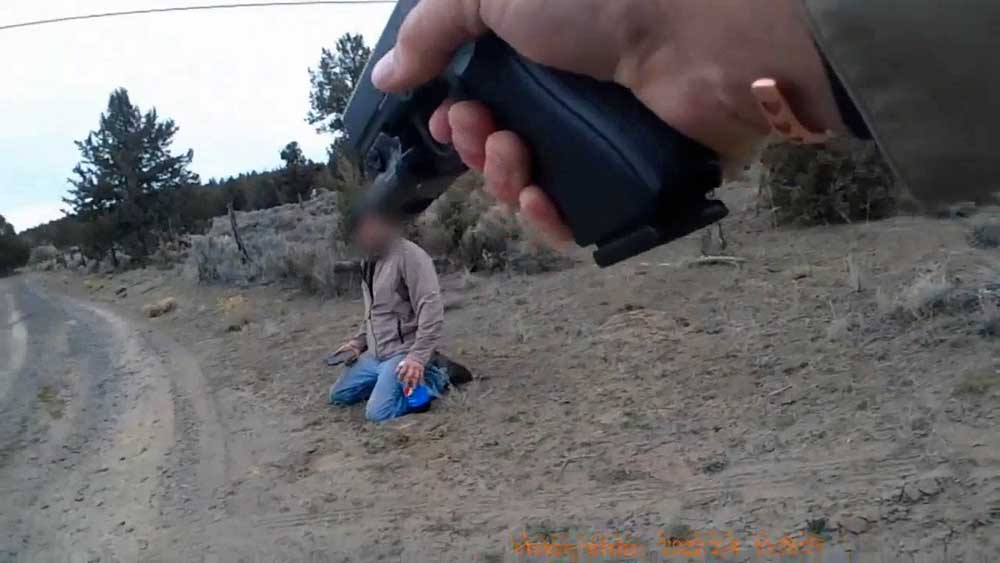Wrongful death complaint filed against Crook County deputy who killed Nick Rodin
Published 3:00 pm Monday, January 2, 2023

- A screen capture from the bodycam footage of the Feb. 4, 2022, encounter between Crook County Sheriff’s Deputy Steven Hatcher and Nick Rodin, whom Hatcher shot and killed.
The estate of Nick Rodin, the man shot and killed by a Crook County sheriff’s deputy last year, filed a wrongful death lawsuit in federal court Sunday.
The complaint names the county and sheriff’s deputy Steven Hatcher, who shot and killed Rodin on Maphet Road south of Prineville, according to attorney Michael Fuller, of the Underdog Law Office in Portland, who is representing Rodin’s estate.
Trending
On Feb. 4, 2022, Hatcher confronted Rodin on the remote road before drawing his weapon and ordering him to the ground. Rodin was unarmed and suffered from schizophrenia and bipolar disorder.
Rodin grew increasingly agitated during the encounter, which was recorded by Hatcher’s body camera. Hatcher threatened to kill Rodin multiple times if he did not comply with his commands. The footage showed Rodin acting erratic and approaching Hatcher, at which point Hatcher fired two rounds into Rodin’s torso, killing him.
In March, Crook County District Attorney Kari Hathorn concluded that Rodin had approached Hatcher in a threatening manner, justifying Hatcher’s actions under Oregon law.
“Mr. Rodin didn’t have to die,” Fuller told The Bulletin. “What we wanted to point out in the complaint is that there were a lot of various options that would have saved his life during that emergency, and instead of choosing one of those options that would have kept Mr. Rodin alive, an option was chosen that resulted in his death.”
In their complaint, attorneys for Rodin’s estate demand a jury trial, claiming Hatcher committed battery, assault and violated Rodin’s constitutional rights when he confronted and then shot him.
The complaint alleges both Hatcher and Crook County were well aware Rodin suffered from mental illness, and that at the time of the confrontation, Hatcher had known Rodin was unarmed and posed no physical threat to either Hatcher or anyone else.
Trending
The complaint also alleges Hatcher’s initial use of force caused Rodin to behave the way he did during the confrontation.
“At the time of his death, Mr. Rodin was experiencing a mental health episode triggered by or exasperated by Mr. Hatcher’s initial use of force: Mr. Hatcher pointed a gun at Mr. Rodin and repeatedly threatening to kill Mr. Rodin,” the complaint states.
On the day Rodin was shot by Hatcher, Rodin had two outstanding felony warrants for his arrest in two separate incidents. One for assault with a dangerous weapon and the other from out of state for battery with a dangerous weapon. Rodin had also called Crook County 911 dispatch earlier that day asking to be arrested and claiming he was armed with a knife and a handgun.
When Hatcher found Rodin, he pulled up in his sheriff’s vehicle, the complaint states.
“Mr. Rodin, nervous of the police, kept walking forward and pulled out his phone,” the complaint states.
“Suddenly, and without provocation, Mr. Hatcher leapt out of his car with his handgun drawn, behaving like a spaghetti-western cowboy. Mr. Hatcher pointed his handgun at Mr. Rodin in an act of force.”
Hatcher ordered Rodin to keep his hands visible and to get on the ground, which Rodin did. In his hands, Rodin had his cell phone and a plastic soda bottle.
“Mr. Hatcher saw both these objects in Mr. Rodin’s hands and recognized them as the harmless objects they were,” the complaint states. “Mr. Hatcher kept his handgun trained on Mr. Rodin instead of deescalating.”
The complaint alleges Hatcher’s failure to deescalate the situation triggered the behavior used to justify Hatcher’s use of deadly force.
Fuller, the attorney representing Rodin’s estate, said while his team’s position all along has been that while Rodin’s killing by Hatcher didn’t rise to the level of a crime, under the civil standard, there is evidence he acted unreasonably.
Fuller said one of the first courses of action as the case proceeds will be to interview Hatcher in a deposition. One question he hopes the deposition will answer is whether Hatcher’s behavior on the day he killed Rodin was a result of being poorly trained or if he failed to follow his training when approaching someone he knew to be suffering from mental illness.
“Unfortunately we haven’t been able to ask him his position so we don’t know if he would do everything the same again,” Fuller said. “Presumably he wouldn’t. Presumably he would have deescalated, or waited for backup, never drawn his firearm in the first place, even retreated if that is what is necessary.”
Rodin’s mother, LeeAnne Trent, was relieved to hear the complaint was filed.
“That makes me so happy,” she said, her voice cracking with emotion. “It’s a relief to know that this is finally going to be set in motion. Because I know it’s been a long haul, and I understand that things take time, but I was at the end of my ropes thinking it wasn’t going to happen.”
Trent, who lives in Oklahoma, has not returned to Oregon since her son’s death, but plans to return in March to meet her granddaughter, Rodin’s daughter, who was born in March shortly after his death. Trent has only met her granddaughter, Nicki Ryan Rodin, over video calls.
“The baby is wonderful, she looks just like her daddy,” Trent said.
Trent said Nicki has just started crawling. Family members have shown her photos of her father.
“She holds his pictures,” Trent said. “She’ll point at his pictures and say ‘dada.’”








